The rate Earth is warming hit an all-time high in 2023 with 92 percent of last year’s surprising record-shattering heat caused by humans, top scientists calculated.
The group of 57 scientists from around the world used United Nations-approved methods to examine what’s behind last year’s deadly burst of heat. They said even with a faster warming rate they don’t see evidence of significant acceleration in human-caused climate change beyond increased fossil fuel burning.
Last year’s record temperatures were so unusual that scientists have been debating what’s behind the big jump and whether climate change is accelerating or if other factors are in play.
“If you look at this world accelerating or going through a big tipping point, things aren’t doing that,” study lead author Piers Forster, a Leeds University climate scientist, said. “Things are increasing in temperature and getting worse in sort of exactly the way we predicted.”
It’s pretty much explained by the buildup of carbon dioxide from rising fossil fuel use, he and a co-author said.
Last year the rate of warming hit 0.26 degrees Celsius (0.47 degrees Fahrenheit) per decade — up from 0.25 degrees Celsius (0.45 degrees Fahrenheit) the year before. That’s not a significant difference, though it does make this year’s rate the highest ever, Forster said.
Still, outside scientists said this report highlights an ever more alarming situation.
“Choosing to act on climate has become a political talking point but this report should be a reminder to people that in fact it is fundamentally a choice to save human lives,” said University of Wisconsin climate scientist Andrea Dutton, who wasn’t part of the international study team. “To me, that is something worth fighting for.”
The team of authors — formed to provide annual scientific updates between the every seven- to eight-year major UN scientific assessments — determined last year was 1.43 degrees Celsius warmer than the 1850 to 1900 average with 1.31 degrees of that coming from human activity. The other 8 percent of the warming is due mostly to El Nino, the natural and temporary warming of the central Pacific that changes weather worldwide and also a freak warming along the Atlantic and just other weather randomness.
On a larger 10-year time frame, which scientists prefer to single years, the world has warmed about 1.19 degrees Celsius (2.14 degrees Fahrenheit) since pre-industrial times, the report in the journal Earth System Science Data found.
The report also said that as the world keeps using coal, oil and natural gas, Earth is likely to reach the point in 4.5 years that it can no longer avoid crossing the internationally accepted threshold for warming: 1.5 degrees Celsius (2.7 degrees Fahrenheit ).
That fits with earlier studies projecting Earth being committed or stuck to at least 1.5 degrees by early 2029 if emission trajectories don’t change. The actual hitting of 1.5 degrees could be years later, but it would be inevitable if all that carbon is used, Forster said.
It’s not the end of the world or humanity if temperatures blow past the 1.5 limit, but it will be quite bad, scientists said. Past UN studies show massive changes to Earth’s ecosystem are more likely to kick in between 1.5 and 2 degrees Celsius of warming, including eventual loss of the planet’s coral reefs, Arctic sea ice, species of plants and animals — along with nastier extreme weather events that kill people.
Last year’s temperature rise was more than just a little jump. It was especially unusual in September, said study co-author Sonia Seneviratne, head of land-climate dynamics at ETH Zurich, a Swiss university.
The year was within the range of what was predicted, albeit it was at the upper edge of the range, Seneviratne said.
“Acceleration if it were to happen would be even worse, like hitting a global tipping point, it would be probably the worst scenario,” Seneviratne said. “But what is happening is already extremely bad and it is having major impacts already now. We are in the middle of a crisis.”
University of Michigan environment dean Jonathan Overpeck and Berkeley Earth climate scientist Zeke Hausfather, neither of whom were part of the study, said they still see acceleration. Hausfather pointed out the rate of warming is considerably higher than 0.18 degrees Celsius (0.32 Fahrenheit) per decade of warming that it was between 1970 and 2010.
Scientists had theorized a few explanations for the massive jump in September, which Hausfather called “gobsmacking.” Wednesday’s report didn’t find enough warming from other potential causes. The report said the reduction of sulfur pollution from shipping — which had been providing some cooling to the atmosphere — was overwhelmed last year by carbon particles put in the air from Canadian wildfires.
The report also said an undersea volcano that injected massive amounts of heat-trapping water vapor into the atmosphere also spewed cooling particles with both forces pretty much canceling each other out.
Texas Tech climate scientist and chief scientist at the Nature Conservancy Katharine Hayhoe said “the future is in our hands. It’s us — not physics, but humans — who will determine how quickly the world warms and by how much.”
New study finds Earth warming at record rate, but no evidence of climate change accelerating
https://arab.news/9ax3u
New study finds Earth warming at record rate, but no evidence of climate change accelerating

- The group of 57 scientists said they don’t see evidence of significant acceleration in human-caused climate change
Trump flies on Air Force plane to Washington as Biden sticks to tradition

- For his less than three-hour flight to Washington Dulles International Airport, Trump will fly aboard a specially configured Boeing 757-200 in trademark blue and white colors and bearing the words “United States of America”
WEST PALM BEACH, Florida: P resident-elect Donald Trump headed to Washington on Saturday ahead of his inauguration on a US military airplane supplied by US President Joe Biden, as the outgoing president emphasized sticking with traditional transition norms.
Trump will arrive in Washington on Saturday evening for celebrations to mark his return to office on Monday.
For the occasion, he is ditching his navy and crimson “Trump Force One” he often flies in favor of a government plane Biden sent to Florida. Biden has stressed to his officials that they must work with Trump’s transition team, a sharp contrast to the last transition when Trump refused to attend the inauguration or acknowledge Biden’s win.
Both planes sat on the tarmac at Palm Beach International Airport before Trump’s departure Saturday. Trump’s son Eric and Eric’s wife Lara boarded the private plane.
For his less than three-hour flight to Washington Dulles International Airport, Trump will fly aboard a specially configured Boeing 757-200 in trademark blue and white colors and bearing the words “United States of America.”
His daughter Ivanka and her husband Jared Kushner were spotted boarding that aircraft Saturday afternoon.
It is the same model aircraft that’s called Air Force Two when flown by the vice president but is also used by the first lady, cabinet members and other high-ranking officials.
It is the norm for presidents-elect to take such a government-provided plane to their inauguration, though Biden did not.
In 2021, Biden had planned to arrive by train but the plan was canceled after the Secret Service raised security concerns after thousands of Trump supporters stormed the US Capitol on January 6, 2021, in a bid to overturn his election defeat.
The Trump administration offered no plane and Biden ended up taking a private jet to Washington, according to a person familiar with the matter.
Photographs from Trump’s 2017 arrival in the Washington area to take office for his first term showed that he used a similar US aircraft then.
The White House and the US Air Force could not immediately be reached for comment.
Russia claims capture of two settlements in eastern Ukraine

- Ukrainian military statements made no mention of either of the two villages changing hands, but referred to heavy fighting near the key city of Pokrovsk
MOSCOW: Russian forces took control of two more settlements in eastern Ukraine’s Donetsk region, Russia’s Defense Ministry said on Saturday, the latest in a series of gains it has reported in its steady advance westward.
The ministry statement said Russian forces were now in control of Petropavlivka, a village between the towns of Pokrovsk and Kurakhove, focal points in fighting in recent months in the area.
It also noted the capture of Vremivka, one of a cluster of small towns further south in the Donetsk region.
The ministry also said Russian forces hit Ukraine’s military facilities with high-precision weapons in response to an Ukrainian attack on Russia’s southern Belgorod region with US-made ATACMS missiles.
Reuters could not independently verify battlefield reports from either side in the 34-month-old conflict.
Ukrainian military statements made no mention of either of the two villages changing hands, but referred to heavy fighting near the key city of Pokrovsk.
Ukraine’s popular Deep State blog, which documents changes in the positions held by both sides using open source materials, placed both Petropavlivka and Vremivka in Russian hands.
The spokesperson for the Ukrainian military’s Khortytsya, or eastern, group of forces dismissed for the second day running any notion that Russian forces had entered Pokrovsk.
“There have been no developments in Pokrovsk, things are stable,” Viktor Trehubov told national television. “The enemy is not there.”
The city is a transport hub and site of Ukraine’s only coking coal pit, where work was suspended this week.
Russia’s military, after failing to advance on the capital Kyiv in the weeks following its February 2022 invasion of Ukraine, has since focused its efforts of capturing all of the Donbas — made up of Donetsk and Luhansk regions.
It now holds about 20 percent of Ukraine’s territory.
The Ukrainian military’s General Staff, in a late night report, said Russian forces trying to pierce Ukrainian defenses had launched 84 attacks in the Pokrovsk sector. Fourteen battles were still raging in the area.
The report listed a series of villages in the sector which it said had come under Russian attack — including three which Russia’s military said it secured in the past week and another where Russia said it took control last month.
Arrests made as thousands join London pro-Palestinian rally on eve of Gaza truce

- The London rally took place in Whitehall, site of the main British government offices, after police rejected the route initially proposed by organizers
LONDON: Thousands of pro-Palestinian supporters gathered in central London Saturday, on the eve of the start of a ceasefire between Israel and Hamas, hoping to put “pressure” to ensure the ceasefire holds.
“We desperately want to be optimistic” about the truce, Sophie Mason told AFP.
“And so we need to be out on the streets in order to make sure the ceasefire holds,” said the 50-year-old, who is a regular at the pro-Palestinian demonstrations in the British capital.
77 people were arrested for breaching the authorized perimeter for the protest, and other protesters had already been arrested for various offenses, the Metropolitan police said on X.
A counter-demonstration with around 100 protesters waving Israeli flags also gathered nearby.
The ceasefire, which comes into effect Sunday morning (0630 GMT), involves the release of Israeli hostages held by Hamas and Palestinian prisoners held by Israel, Israeli withdrawal from densely populated areas of Gaza and an increase in humanitarian aid deliveries to the war-ravaged region.
The London rally took place in Whitehall, site of the main British government offices, after police rejected the route initially proposed by organizers — which the Met police said would have been in the vicinity of a synagogue.
Participants held up placards bearing slogans including “Stop arming Israel” or “Gaza, stop the massacre” amid regular chants of “From the river to the sea, Palestine will be free.”
“Obviously, we’re delighted there’s a ceasefire,” said Linda Plant, a retiree from London, however, pointing out that Israeli strikes on Gaza have continued since the ceasefire deal was announced Wednesday.
“We need to make pressure to make that ceasefire hold” and for international aid to reach Gaza, said Ben, 36, a workers union member who only shared his first name.
For Anisah Qausher, a student, the ceasefire is “too late, I think it’s too little.”
While she hopes it will bring “temporary relief,” she believes that “we’re gonna need to do a lot more,” citing the challenge of rebuilding Gaza.
Hamas’s October 7, 2023 attack on Israel triggered the war and resulted in the deaths of 1,210 people, mostly civilians, according to an AFP tally of Israeli official figures.
Of the 251 people taken hostage, 94 are still in Gaza, including 34 the Israeli military says are dead.
Israel’s retaliatory campaign has destroyed much of Gaza, killing 46,899 people, most of them civilians, according to figures from the Hamas-run territory’s health ministry that the United Nations considers reliable.
Could the trial of suspected Lockerbie bombmaker rewrite the narrative of Pan Am Flight 103?

- The passenger jet exploded over the town of Lockerbie, Scotland, on Dec. 21, 1988, killing 270 people onboard and on the ground
- Libyan intelligence officer Abdelbaset Al-Megrahi was the only person convicted over the attack, but new evidence has since come to light
LONDON: The basic facts are undisputed, but controversy continues to surround the identity of those responsible for the terrorist bombing of Pan Am Flight 103, Clipper Maid of the Seas, over the Scottish town of Lockerbie on the night of Dec. 21, 1988.
Now, more than 37 years on from the tragedy that claimed the lives of 270 people from 20 countries, a third Libyan man is about to stand trial for his alleged part in the plot, offering possible closure to grieving families, but also likely reopening old wounds.
On Dec. 21, 1988, Pan Am Flight 103, a Boeing 747 jumbo jet en route from London Heathrow to New York JFK Airport, was a little over one hour into its flight, cruising at an altitude of 9,400 meters.

The cabin crew were moving down the aisles, serving drinks. Many of the 243 passengers would have been watching the in-flight movie, “Crocodile Dundee II,” which, in the days before seat-back screens, had begun to play on the drop-down overhead screens.
Moments later, a little after 7:02 pm, air traffic controllers in Scotland lost contact with the pilots and watched in horror as the aircraft’s radar image broke up into five distinct pieces fanning out across their screens.
A bomb hidden in a suitcase in the cargo hold had exploded with devastating effect. The jumbo disintegrated rapidly, and bodies and flaming aircraft parts began to rain down on and around the town of Lockerbie.
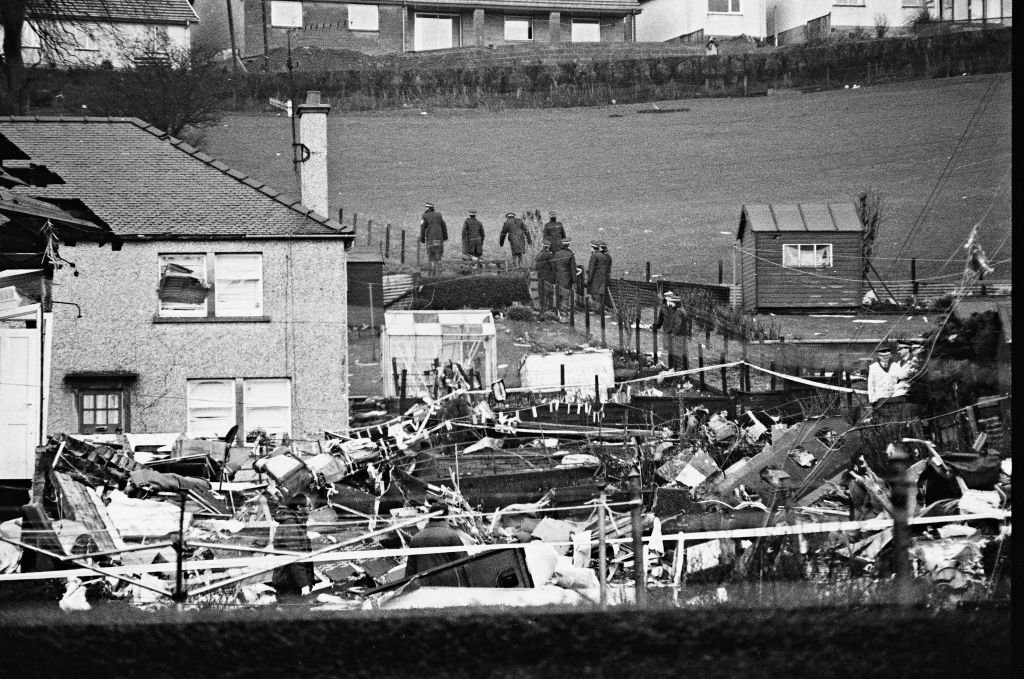
Even as the bodies of all 259 passengers and crew fell to earth, 11 residents of Lockerbie were killed in their homes by falling wreckage and a fireball caused when the aircraft’s fuel-laden wings gouged out a massive crater in a residential area.
Despite a search over a wide area of countryside that lasted six weeks, the bodies of 10 of Flight 103’s passengers were never found. Only the “fragmented remains” of 13 passengers could be identified in or near the crater.
As the media rushed to the scene, horror stories began to emerge. Corpses and body parts were strewn about the town and surrounding fields. Some of the dead were still strapped into their seats, sitting upright in rows of three and appearing asleep, rather than dead.
FASTFACTS
• Pan Am Flight 103 exploded over the town of Lockerbie, Scotland, on Dec. 21, 1988, killing 270 people.
• Investigators concluded Libyan agents had planted a bomb, hidden in a suitcase, on the Boeing 747.
• Libyan intelligence officer Abdelbaset Al-Megrahi was convicted in 2001 for his involvement in the attack.
A military helicopter pilot who joined the search later described finding one man clutching a book, and others still wearing their Walkman headphones.
Three children, siblings aged 6, 3 and 10 months, were found together, with the eldest two holding the baby’s hands.
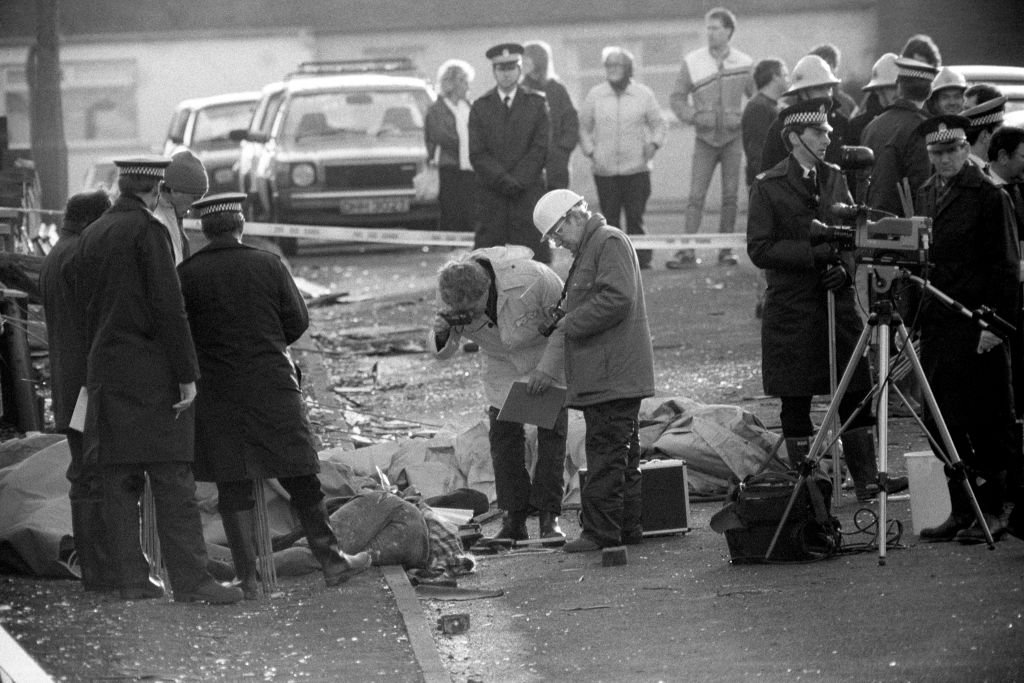
Adding to the distress of the bereaved, a paper published by a pathologist in an obscure medical journal revealed that, miraculously and shockingly, at least two of the passengers had probably survived the fall to earth with relatively minor injuries, only to die of exposure because rescuers found them too late.
Within a day, before a bomb had even been confirmed as the cause of the disaster, several groups had claimed responsibility, and at first, suspicion fell on the Syrian-based Popular Front for the Liberation of Palestine — General Command.
But on Nov. 13, 1991, after a three-year joint investigation by Scottish police and the American FBI, indictments for murder were issued against two Libyans — intelligence officer Abdelbaset Al-Megrahi and Lamin Khalifah Fhimah, the station manager for Libyan Arab Airlines at Luqa Airport in Malta.
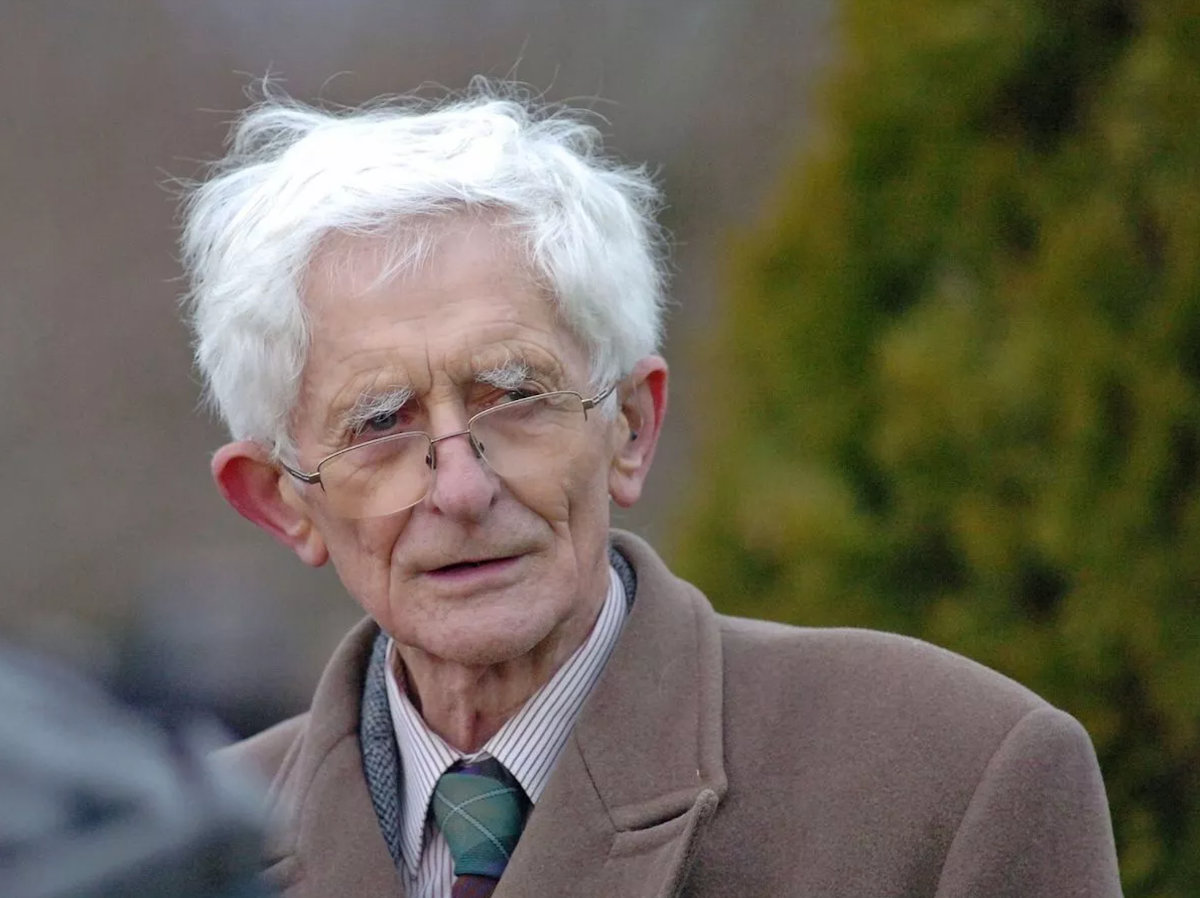
Investigators believed the bomb had originated from Malta, making its way to Flight 103 in London in an unaccompanied suitcase via a feeder flight from Frankfurt International Airport.
It would be more than 11 years after the bombing before the trial of the two men began. In exchange for relaxing international sanctions, Libyan leader Muammar Qaddafi agreed to hand them over for trial at a special Scottish court convened on neutral ground, in The Netherlands.
On Jan. 31, 2001, the judges announced their verdicts. Fhimah was acquitted of the 270 charges of murder against him, but Al-Megrahi was found guilty and sentenced to life imprisonment.
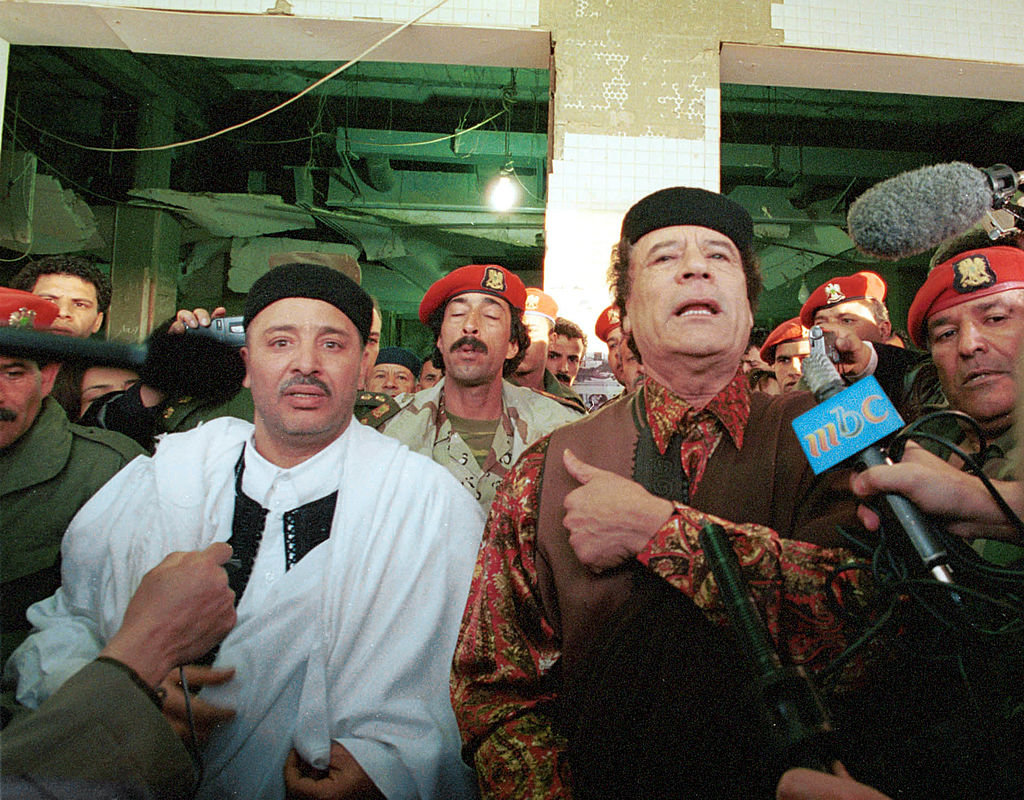
Jailed in Barlinnie prison, Scotland, Al-Megrahi would serve only a fraction of his sentence. Following a diagnosis of terminal prostate cancer, on Nov. 2, 2009, he was released by the Scottish government on compassionate grounds and returned to Libya, where he died two years and nine months later.
But the case was far from closed.
From the outset, conspiracy theories swirled around the tragedy. Some latched onto the fact that several senior US intelligence officials and operatives had been on board the aircraft and accused rogue CIA agents of carrying out the bombing to cover up an illicit drugs operation.
Others pointed the finger at Iran, which certainly had a motive. On July 3, 1988, just five months before Flight 103, the American warship USS Vincennes had accidentally shot down an Iran Air passenger flight en route from Tehran to Dubai, with the loss of all 290 people on board.
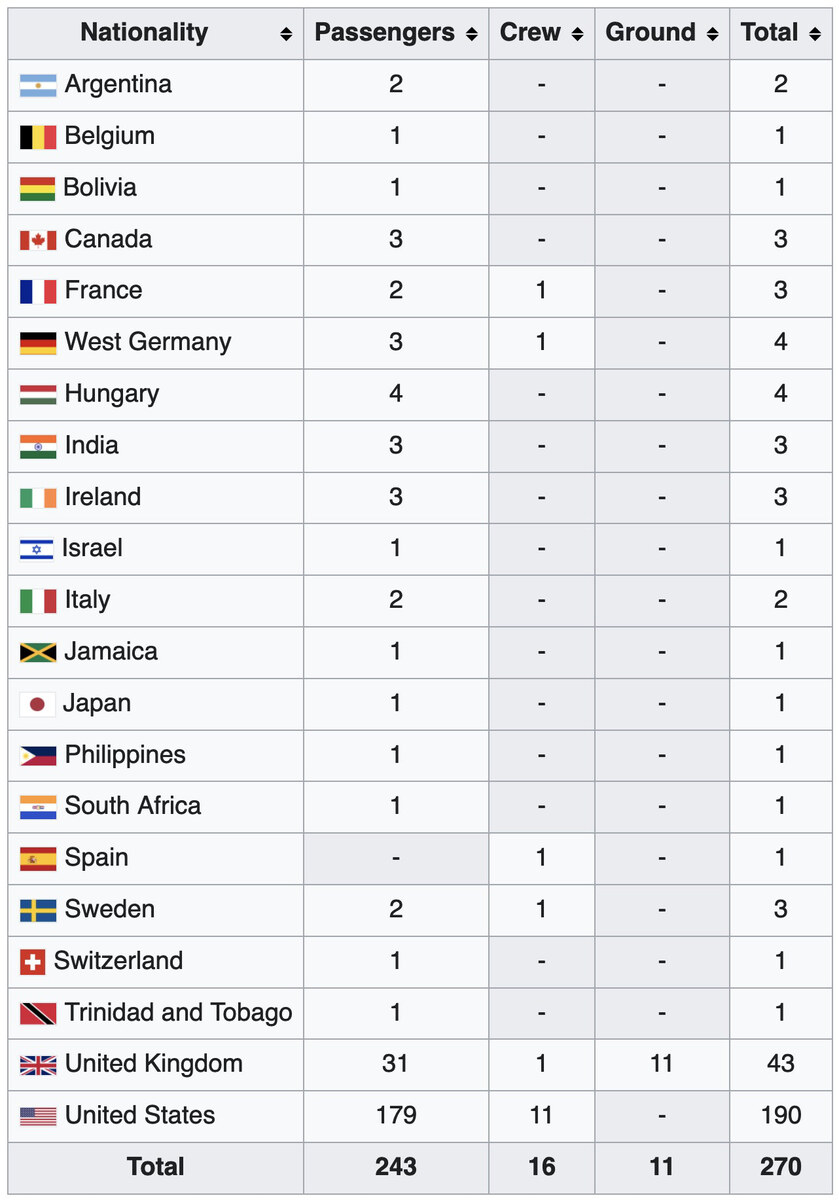
But the greatest challenge to the official version of events, which ended with the jailing of Al-Megrahi, came from an unexpected quarter — the father of one of the passengers who was killed on the flight.
Jim Swire, an English doctor who lost his daughter, Flora, came to believe that Al-Megrahi was innocent and that the evidence against him and Fhimah had been falsified. To the dismay of some of the other Lockerbie families, Swire campaigned for years on Al-Megrahi’s behalf, even traveling to Tripoli to meet him after his release.
This year, which marks the 37th anniversary of the downing of Flight 103, Swire’s campaign is the subject of two transatlantic TV dramatizations — the five-part “Lockerbie: A Search for Truth,” starring Colin Firth, and a BBC-Netflix drama series, “Lockerbie.”
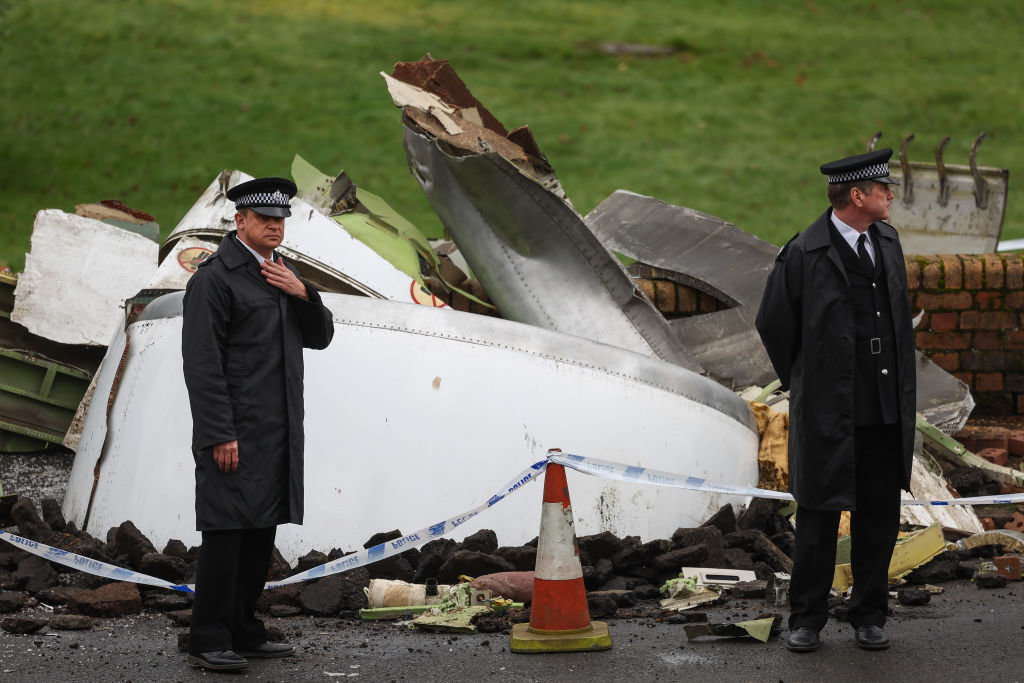
What both dramatizations will not cover, however, is the latest extraordinary chapter in the story.
Last month, Lockerbie relatives on both sides of the Atlantic received a sobering piece of news. A 20-meter-long section of the fuselage of the Clipper Maid of the Seas, which had been reconstructed as part of the original investigation, would be flying again, as cargo on board an aircraft transporting it to Washington D.C. as evidence in the trial of a third suspect accused of involvement in the downing of Flight 103.
On May 12 this year, a man identified in court papers as Abu Agila Mohammad Masud Kheir Al-Mariami, or simply Masud, will go on trial charged with having made the bomb that destroyed Pan Am Flight 103.
The original investigation identified a suspect called Abu Agela Masud, who at the time could not be traced. But according to an affidavit filed by an FBI special agent in December 2020, in 2017, the bureau received a transcript in Arabic of an interview conducted by Libyan security officers in September 2012 with a man identified as Masud.

According to the transcript, Masud, a former colonel in Libya’s External Security Organization, had worked as a “technical expert” for the ESO, “building explosive devices from in or around 1973 to in or around 2011,” when Qaddafi was overthrown.
In the interview, Masud had allegedly “admitted to building the bomb that brought down Pan Am Flight 103 and to working with Megrahi and Fhimah to execute the plot.”
Furthermore, Masud, who also “admitted his involvement in other plots against citizens of the US and other Western countries,” is alleged to have “confirmed that the bombing operation of Pan Am Flight 103 was ordered by Libyan intelligence leadership.”
According to the transcript, he also told his Libyan interrogators that “after the operation, Qaddafi thanked him and other members of the team for their successful attack on the US.”
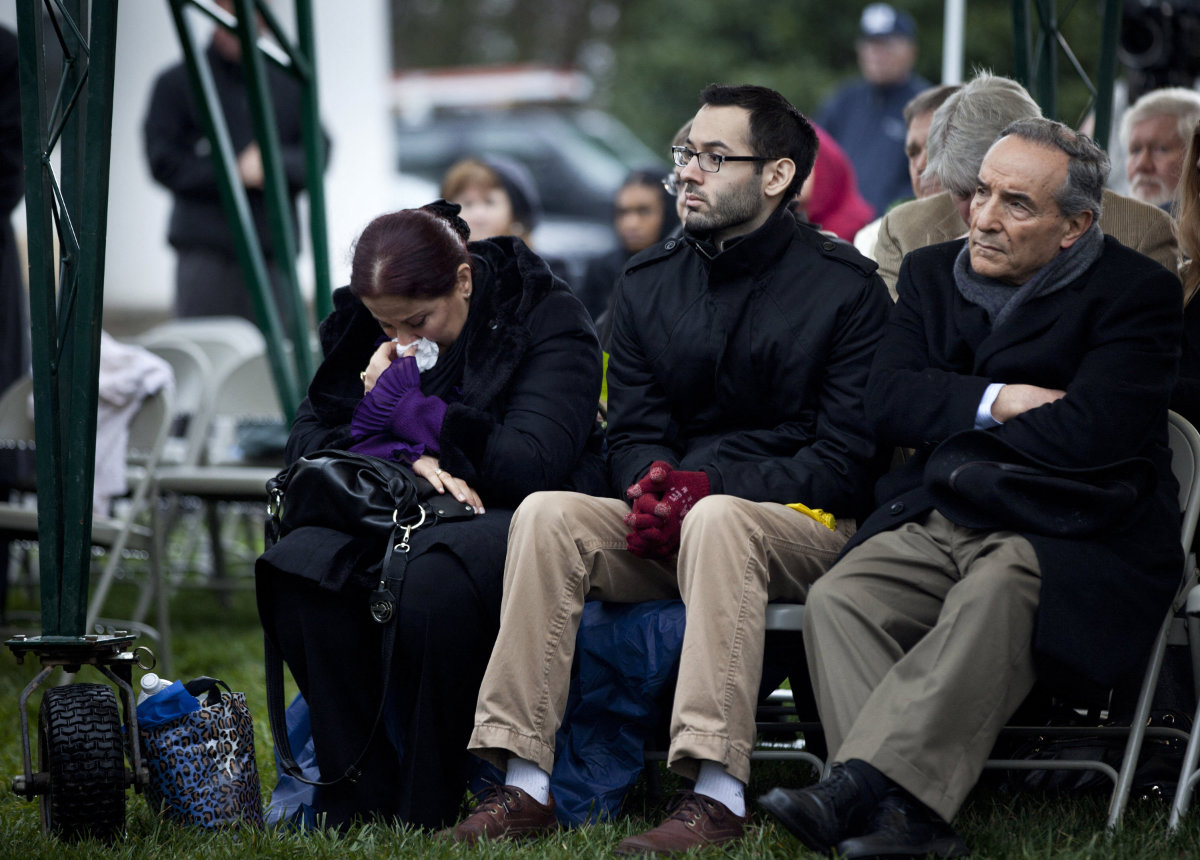
It is not clear why the transcript of the interview was shared with US investigators when it was but, as the FBI affidavit noted, the Libyan law enforcement officer who obtained Masud’s statement had “expressed a willingness to testify at a trial if the Libyan government agrees to make the officer available.”
US authorities announced on Dec. 12, 2022, that Masud was in custody on American soil, and had been charged in a Washington D.C. court. How he got there is uncertain, as there is no extradition treaty between the US and Libya.
Human Rights Watch claims Masud was “violently seized” from his home in the Abu Salim district of Tripoli on Nov. 17, 2022, by members of an “armed group” who arrived in unmarked cars, wore no insignia, and refused to identify themselves.
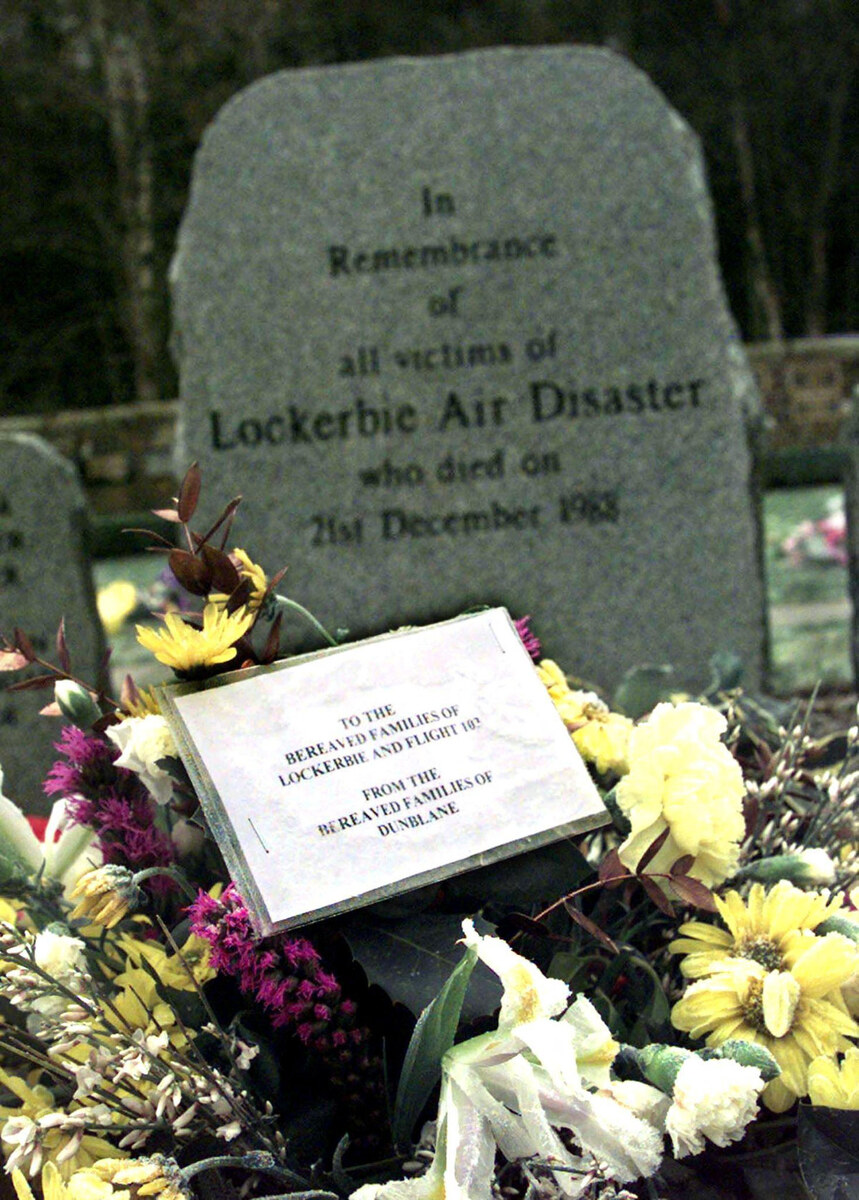
But in a statement at the time, Michael H. Glasheen, acting assistant director in charge of the FBI Washington Field Office, said: “The lawful arrest and presentment in court of the alleged bombmaker … is the product of hard work and partnerships across the globe.”
Eight days later, the US embassy in Libya tweeted that Masud’s transfer to US custody “was lawful and conducted in cooperation with Libyan authorities.”
Depending on what emerges in court in May, Masud’s trial could prove fateful for Lamin Khalifah Fhimah. Although he was acquitted by the Scottish court in 1991, Fhimah remains a wanted man in America.
For those involved in the long search for justice for the victims of Flight 103 and their families, the trial is a last chance to “renew confidence in the justice process around the case,” in the words of Scotland’s public prosecution service.
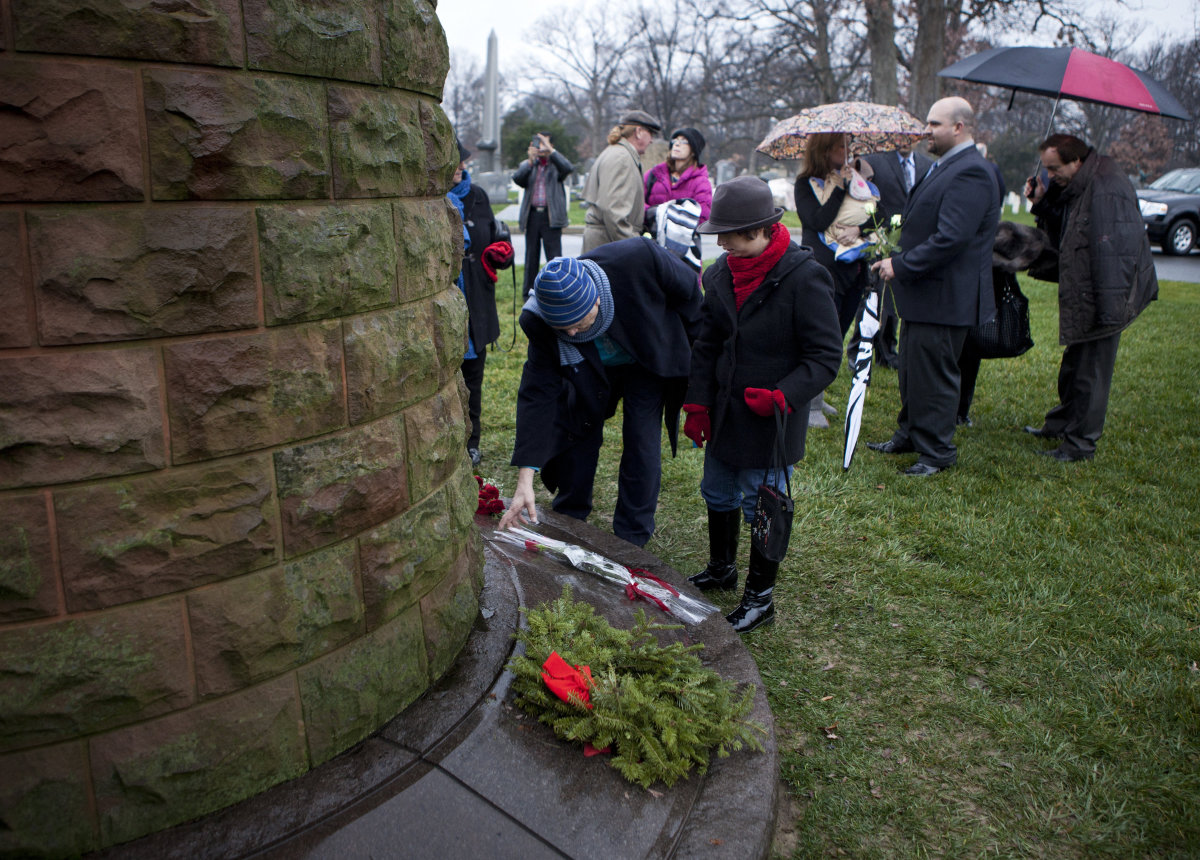
“Scotland’s prosecutors and police, working with counterparts in the US, have remained steadfast in our commitment to uncovering the truth and holding those responsible accountable,” said Dorothy Bain, Scotland’s lord advocate, in a statement last month.
Although the original trial considered evidence from 227 witnesses over 72 days, and Al-Megrahi’s conviction was upheld twice at appeal, “I am aware that not everyone shares the same view of the Crown case,” Bain added.
“I have always believed in the power of the legal process as a tool for fairness and public trust. The forthcoming trial in Washington will bring the facts of this case before the public again, and the circumstances of what happened can be fully understood.”

India police detain second suspect in Saif Ali Khan stabbing incident

- The Bollywood star was stabbed six times by an intruder during a burglary attempt
- Doctors say he out of danger after undergoing surgery in the wake of the incident
MUMBAI: Police in the central Indian state of Chhattisgarh on Saturday detained a second person suspected of involvement in a knife attack in which Bollywood actor Saif Ali Khan was wounded.
Khan, 54, was stabbed six times by an intruder during a burglary attempt at his home in Mumbai early on Thursday. He had surgery after sustaining stab wounds to his spine, neck and hands, and is out of danger, doctors said.
“We got information from Mumbai Police that a suspect is traveling by Jnaneswari Express train,” Sanjeev Sinha, a represenatative of the Railway Protection Force, told ANI news agency, in which Reuters holds a minority stake.
“...Mumbai Police officials were contacted through video call and the suspect’s identity was confirmed. He has been detained,” Sinha said.
Police in India’s financial capital of Mumbai had on Friday detained another key suspect in the knife attack.
The attack on Khan, one of Bollywood’s most bankable and well-known actors, shocked the film industry and Mumbai residents, with many calling for better policing and security.



















